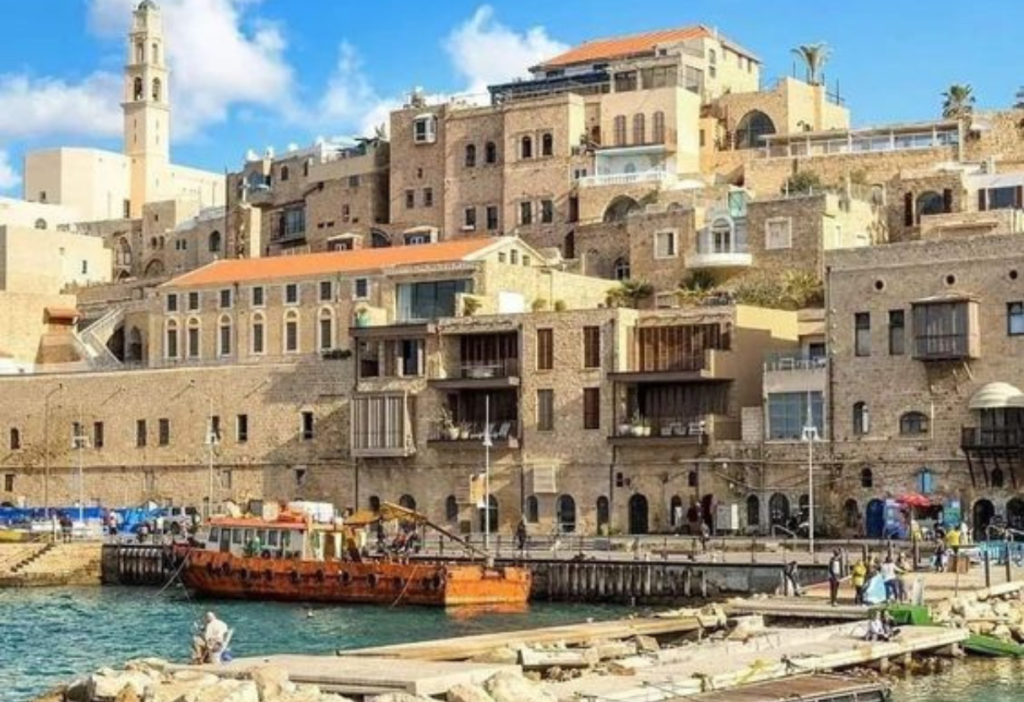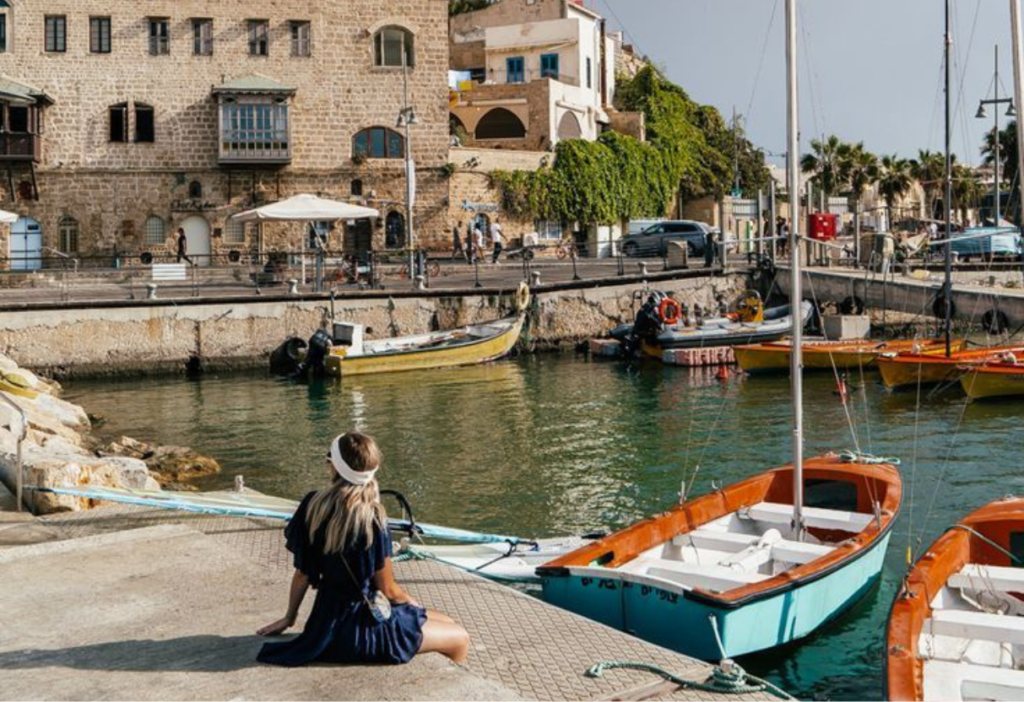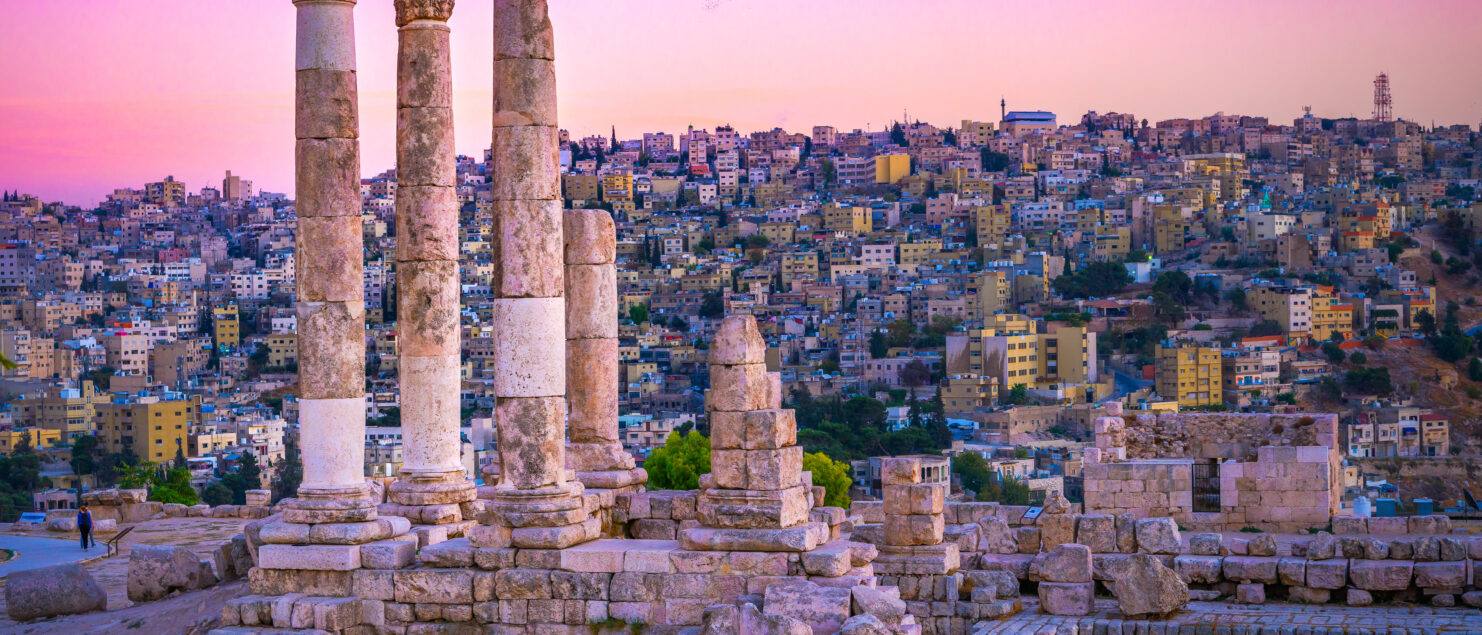Travel from Israel to Jordan: Everything You Need to Know
If you’re planning a trip to Israel, you might want to consider extending your travels to Jordan. With its rich history and stunning landscapes, Jordan is a must-visit destination for any avid traveller. Fortunately, travelling from Israel to Jordan is relatively easy, with several options available to suit your needs.

Image credit: 𝐡𝐚𝐧𝐧𝐚𝐡 𝐥𝐨𝐮𝐢𝐬𝐞 Pinterest
One of the most popular ways to travel from Israel to Jordan is by joining an organized group tour. These tours typically depart from major cities in Israel, such as Tel Aviv or Jerusalem, and take you to popular destinations in Jordan, such as Petra or Wadi Rum. This option is ideal for those who want a hassle-free travel experience and the opportunity to meet other travellers.
If you prefer to travel independently, you can also make your way to Jordan by car or bus. There are several border crossings between Israel and Jordan, including the northern Jordan River border and Eilat’s Wadi Arava border. Keep in mind that you will need to obtain a visa to enter Jordan, which can be purchased at the border if you’re crossing at the Jordan River Border Crossing. For other border crossings, such as the Wadi Araba Border Crossing, you will need to arrange your visa in advance.
Overview of Travel Options
Travelling from Israel to Jordan is easy and there are several options available for you to choose from. You can travel either by air or by land. Here are the details of both options:
By Air
There are several flights available from Tel Aviv to Amman. The flight takes around 1 hour and 15 minutes. The airlines that operate on this route include Royal Jordanian, Israir Airlines and Arkia Israeli Airlines. The flights are frequent and you can easily book your tickets online.
By Land
If you prefer to travel by land, there are two border crossings available for you to choose from. These include:
-
Yitzhak Rabin Terminal/Wadi Araba Crossing: This is the most popular border crossing for those travelling from Israel to Jordan. It is located close to the city of Aqaba and provides the shortest waiting times. The cost to exit from Israel is around 100 ILS (30 USD) and 8 JD (12 USD) to exit from Jordan.
-
Beit She’an (Jordan River)/Sheikh Hussein Crossing: This border crossing is located in the north of Jordan and is a good option if you are travelling from the Galilee region of Israel. The cost to exit from Israel is around 102 ILS (31 USD) and 40 JD (56 USD) to exit from Jordan.
It is important to note that you can apply for a visa on arrival when travelling to Jordan. The visa is issued at the entry point of the country. Israeli citizens can apply for a visa on arrival. However, it is recommended that you check your visa requirements with at least one more source listed in the link to avoid any inconvenience.
In conclusion, whether you choose to travel by air or by land, travelling from Israel to Jordan is a hassle-free experience.
Visa Requirements and Border Crossings
Visa Procedures
If you’re planning to travel from Israel to Jordan, you will need a valid passport, which must be valid for at least six months from the date of entry. Additionally, you will require a visa to enter Jordan. Depending on your nationality, you may be able to obtain a visa on arrival at the border crossing or at the Jordanian embassy in your country of residence.
It is essential to check the visa requirements and regulations before traveling to Jordan. The Jordanian embassy in your country of residence can provide you with the necessary information.
Border Control Points
There are three main border crossings between Israel and Jordan: the Allenby/King Hussein Bridge, the Beit She’an/Sheikh Hussein Bridge, and the Wadi Araba/Yitzhak Rabin Border Crossing.
The Allenby/King Hussein Bridge is the most common crossing point for tourists. However, it is not recommended to use this crossing point if you’re in a hurry, as it can take several hours to cross. The Beit She’an/Sheikh Hussein border is the closest to Tel Aviv and Jerusalem and offers a Jordan visa on arrival. The Wadi Araba/Yitzhak Rabin Border Crossing is the most convenient if you’re traveling to Petra or Aqaba.
It is advisable to check the opening hours of the border crossing before traveling, as they can vary depending on the time of year. It’s also important to note that the border crossing may close without notice due to security concerns.
When crossing the border, you will need to go through passport control and customs. It is essential to have all the necessary documents, including your passport, visa, and any relevant travel documents, readily available. You may also be asked to declare any items that you’re bringing into the country, such as food, alcohol, or tobacco.
In conclusion, traveling from Israel to Jordan is relatively straightforward, but it’s essential to check the visa requirements and border crossing regulations before traveling. By following the rules and regulations, you can ensure a smooth and hassle-free journey.
Transportation Within Jordan
If you’re planning to travel around Jordan, there are several transportation options available to you. Here are some of the most popular ones:
Public Transport
Jordan has a well-developed public transport system, with buses and minibuses operating throughout the country. The buses are generally safe and reliable, and they are a great way to get around if you’re on a budget. However, they can be crowded and uncomfortable, especially during peak hours. You can find bus stations in most towns and cities, and the fares are usually very reasonable.
Car Hire
If you prefer to have more flexibility and independence, you can hire a car in Jordan. There are several car rental companies operating in the country, and you can choose from a range of vehicles to suit your needs and budget. However, driving in Jordan can be challenging, especially if you’re not used to the local driving style. The roads can be narrow and crowded, and there are often no clear road signs or markings. You should also be aware that petrol is relatively expensive in Jordan.
Private Transfers
If you want to travel in comfort and style, you can book a private transfer in Jordan. This is a great option if you’re travelling with a group or if you want to avoid the hassle of public transport. You can choose from a range of vehicles, including luxury cars and minibuses, and you’ll have a dedicated driver who will take you wherever you want to go. However, private transfers can be quite expensive, especially if you’re travelling alone or on a tight budget.
Overall, the transportation options in Jordan are diverse and cater to different needs and budgets. Whether you choose public transport, car hire or private transfers, you can be sure that you’ll be able to get around the country easily and comfortably.
Cultural Etiquette and Guidelines

Image credit: Ali Stone Pinterest
Dress Code
When travelling from Israel to Jordan, it’s important to dress appropriately according to the local customs and traditions. Jordan is a predominantly Muslim country, and it’s expected that visitors dress modestly out of respect for the culture. This means that both men and women should avoid wearing revealing clothing such as shorts, tank tops, and sleeveless shirts. Instead, it’s recommended that you wear loose-fitting clothing that covers your shoulders and knees.
Women should also consider wearing a headscarf when visiting religious sites such as mosques or churches. It’s also important to remove your shoes before entering these places of worship. Men should avoid wearing shorts or sleeveless shirts when visiting religious sites.
Social Norms
Jordan is known for its warm hospitality, and it’s important to reciprocate this kindness by being respectful and courteous to the locals. When greeting someone, it’s customary to shake hands, and it’s considered polite to inquire about their health and wellbeing.
It’s also important to avoid public displays of affection, as this is considered inappropriate in Jordanian culture. If you’re invited to someone’s home, it’s customary to bring a small gift such as sweets or flowers as a token of appreciation.
When dining with locals, it’s important to wait until everyone is seated before beginning to eat. It’s also considered polite to leave a small amount of food on your plate as a sign of respect to the host.
In conclusion, by following these cultural etiquette and guidelines, you can show respect for Jordanian culture and traditions, and enjoy a more meaningful and authentic travel experience.
Safety and Security Advisories

Image credit: worldtouradvice Pinterest
Travel Warnings
If you are planning to travel from Israel to Jordan, it is important to be aware of the safety and security advisories. The UK Foreign Office currently advises against all travel to within 3.5 km of the Jordanian border with Syria and east of the town of Ruwayshid in the direction of the border with Iraq due to terrorism and armed conflict. The US Embassy in Jordan also advises exercising increased caution in Jordan due to terrorism, and to seek alternate routes around road closings and monitor local media.
It is important to note that Jordan continues to be a safe and welcoming destination for tourists. The Jordan Tourism Board has emphasized that the recent developments in Gaza do not affect travel to Jordan. However, it is important to remain vigilant and aware of your surroundings at all times, especially in areas with increased risk.
Emergency Contacts
In case of emergency, it is important to have the appropriate contacts on hand. The US Embassy in Jordan can be reached at +962 6 590-6000 for emergencies during business hours. The UK Foreign Office provides a toll-free number for consular assistance at 020 7008 1500. Additionally, it is recommended to enroll in the Safe Traveler Enrollment Program (STEP) to receive security updates.
It is always important to have a plan in case of emergency, including knowing the location of the nearest hospital and having a list of emergency contacts. Keep your passport and other important documents in a safe place and be aware of the local laws and customs. By following these precautions, you can ensure a safe and enjoyable trip to Jordan.
Accommodation Options

Image credit: Have Clothes Pinterest
When travelling from Israel to Jordan, you will need to consider your accommodation options. Here are some options for you to consider:
Hotels and Hostels
Hotels and hostels are the most popular accommodation options for travellers in Jordan. You can find a range of hotels and hostels to suit your budget and preferences. Some of the popular hotel chains in Jordan include Marriott, InterContinental, and Hilton. These hotels offer modern amenities and comfortable rooms.
If you are looking for a more affordable option, hostels are a great choice. Hostels are popular among backpackers and budget travellers. You can find hostels in most major cities in Jordan. Some of the popular hostels in Jordan include Jordan Tower Hotel, Nomads Hotel, and Cliff Hotel.
Alternative Lodgings
If you are looking for a unique experience, you might want to consider alternative lodgings. These include camping, glamping, and homestays.
Camping is a popular option for travellers who want to experience the great outdoors. You can find campsites in most major tourist destinations in Jordan. Some of the popular campsites include Wadi Rum Night Luxury Camp, Little Petra Bedouin Camp, and Rum Stars Camp.
Glamping is a more luxurious option for camping. Glamping combines the comforts of a hotel with the experience of camping. You can find glamping sites in most major tourist destinations in Jordan. Some of the popular glamping sites include Bubble Luxotel, Feynan Ecolodge, and Wadi Rum UFO Luxotel.
Homestays are a great way to experience local culture and hospitality. You can find homestays in most major cities in Jordan. Homestays offer a more authentic experience than hotels and hostels. Some of the popular homestays in Jordan include Beit Al Baraka, Beit Al Mamlouka, and Beit Khairat Al Jabal.
Tourist Attractions and Activities
When travelling from Israel to Jordan, there are plenty of tourist attractions and activities to enjoy. Here are some of the top options to consider:
Historical Sites
Jordan is home to many historical sites that are well worth visiting. Petra is a UNESCO World Heritage Site and is one of the most popular tourist attractions in the country. This ancient city was carved out of sandstone cliffs and is a must-see for anyone interested in history or archaeology. Other historical sites include Jerash, which features well-preserved Roman ruins, and the ancient city of Madaba, which is famous for its mosaics.
Natural Wonders
Jordan is also known for its natural wonders. The Dead Sea is a unique body of water that is so salty that you can float effortlessly on its surface. It is also known for its therapeutic properties and is a popular spot for spa treatments. Wadi Rum is another natural wonder that is well worth visiting. This desert valley is known for its stunning rock formations and is a popular spot for hiking, camping, and rock climbing.
Cultural Experiences
Jordan is home to many different cultures, and there are plenty of opportunities to experience them firsthand. Amman is a vibrant city that is known for its mix of ancient and modern architecture. It is also home to many different museums and art galleries. The Bedouin people are a nomadic group that are still present in Jordan today. You can experience their way of life by staying in a Bedouin camp in Wadi Rum or by taking a camel safari through the desert.
Overall, travelling from Israel to Jordan is an unforgettable experience that offers something for everyone. Whether you are interested in history, nature, or culture, there are plenty of tourist attractions and activities to enjoy.
Practical Information

Image credit: WanderingOnABudget Pinterest
Currency and Payments
When travelling from Israel to Jordan, it’s important to note that the official currency in Jordan is the Jordanian Dinar (JOD). You can exchange your Israeli Shekels (ILS) for Jordanian Dinars at the border crossing or at a currency exchange office in Jordan. It’s recommended to exchange a small amount of money at the border crossing for immediate expenses, and then exchange the rest later at a currency exchange office for a better rate.
Most places in Jordan accept credit cards, but it’s always a good idea to carry some cash with you, especially if you’re planning to visit more remote areas. ATMs are widely available in Jordan, but it’s important to check with your bank beforehand to ensure that your card will work in Jordan.
Connectivity and Communication
When travelling from Israel to Jordan, it’s important to note that mobile phone coverage in Jordan is generally good, but roaming charges can be expensive. It’s recommended to purchase a local SIM card when you arrive in Jordan for cheaper rates. Major mobile phone providers in Jordan include Zain, Orange, and Umniah.
It’s also important to note that internet access in Jordan is generally good, with many cafes, restaurants, and hotels offering free Wi-Fi. However, if you’re planning to travel to more remote areas, it’s recommended to purchase a local SIM card with a data plan to ensure that you have internet access.
Frequently Asked Questions
What are the available modes of transport for crossing from Israel to Jordan?
The most common modes of transport for crossing from Israel to Jordan are by road and air. There are several border crossings between the two countries, with the most popular being the Yitzhak Rabin Terminal/Wadi Araba Crossing. The crossing is open from Sunday to Thursday, and it is advisable to check the opening hours before embarking on the journey.
How does one ensure safety while travelling between Israel and Jordan?
Travelling between Israel and Jordan is generally safe, but it is important to exercise caution and common sense. It is advisable to avoid travelling alone, especially at night, and to stay away from areas that are known to be dangerous. It is also important to carry valid identification documents at all times.
Are there specific border crossings for entry into Jordan from Israel?
Yes, there are specific border crossings for entry into Jordan from Israel. The most popular border crossings are the Yitzhak Rabin Terminal/Wadi Araba Crossing, the Allenby/King Hussein Bridge Crossing, and the Sheikh Hussein Crossing.
What are the operating hours for the border crossings between Jordan and Israel?
The operating hours for the border crossings between Jordan and Israel vary depending on the crossing. It is advisable to check the opening hours before embarking on the journey. Generally, the crossings are open from Sunday to Thursday, and they are closed on Fridays and Saturdays.
Is there a direct train service connecting Israel to Jordan?
No, there is no direct train service connecting Israel to Jordan. The most common modes of transport are by road and air.
Will there be entry restrictions to Jordan if I have previously visited Israel?
There are no entry restrictions to Jordan if you have previously visited Israel. However, it is important to carry valid identification documents and to be prepared to answer questions about your travel history.
Jordan latest travel updates: US, AU , CA , UK
